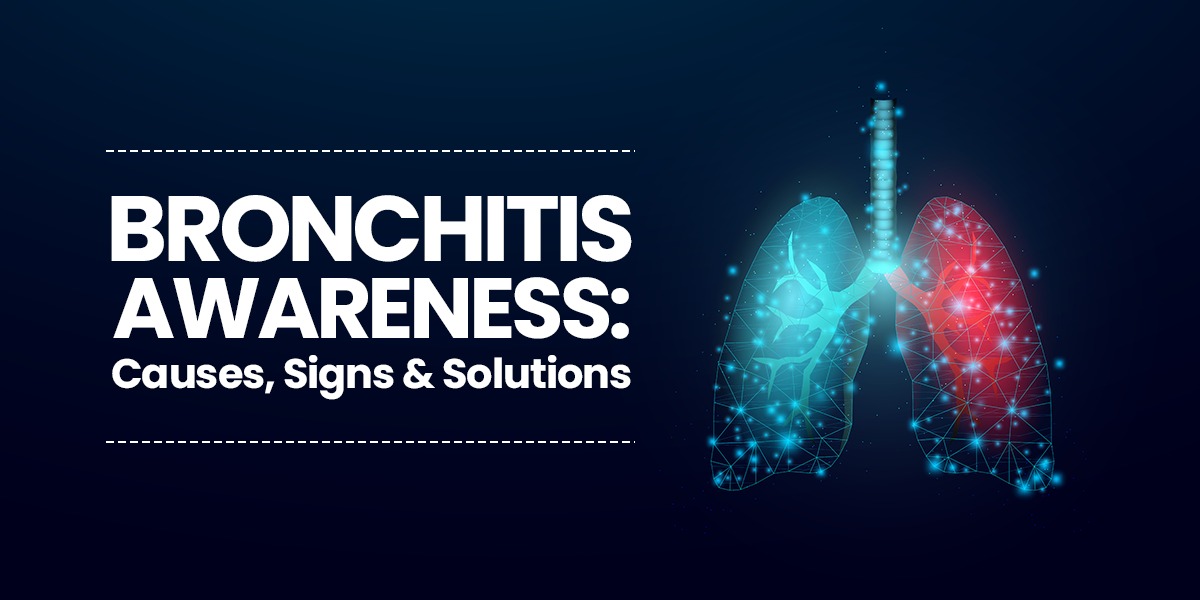Bronchitis Explained: What It Is, Its Symptoms, Types, and Treatment Options

Bronchitis is a common respiratory condition affecting millions worldwide. It occurs when the bronchial tubes that transport air to and from the lungs become inflamed, leading to a persistent cough and difficulty breathing that can negatively affect daily life.
Understanding the illness, noticing symptoms, and being aware of treatments are all good information to have so you can manage the condition and avoid complications.
What is Bronchitis?
What is bronchitis? It is an inflammation of the tubes that carry air to and from your lungs. During inflammation, the bronchial tubes produce excess mucus, leading to a cough specific to bronchitis.
The condition has two main types:
- Acute bronchitis: A short-term condition that typically develops from a cold or respiratory infection
- Chronic bronchitis: A long-term condition that persists for months or years, often caused by smoking or prolonged irritant exposure
Types of Bronchitis
Recognizing the different types of bronchitis can help you understand your symptoms and determine appropriate treatment strategies.
Acute Bronchitis
Acute bronchitis starts quickly and is the most common type of bronchitis. The key features are:
- Duration: Usually lasts 1-3 weeks
- Recovery: Most people will make a complete recovery without any issues
- Frequency: Can happen multiple times throughout life
Chronic Bronchitis
Chronic bronchitis is a more serious problem that falls under the category of chronic obstructive pulmonary disease (COPD). Key points include:
- Duration: Productive cough lasting at least 3 months per year for two consecutive years
- Impact: Progressive condition causing permanent lung damage
- Management: Requires ongoing medical supervision and significant lifestyle changes
Causes of Bronchitis
Various causes can increase your risk of developing this lung condition, such as:
- Viral infections like influenza and common cold viruses
- Bacterial infections (about 10% of cases)
- Exposure to tobacco smoke
- Air pollution and chemical fumes
- Dust and other airborne irritants
Bronchitis Symptoms
Bronchitis symptoms vary depending on the type but commonly include several recognizable warning signs.
Primary Symptoms:
- Persistent cough: Often produces clear, white, yellow, or green mucus
- Chest discomfort: Soreness or tightness in the chest area
- Fatigue: Feeling tired and weak throughout the day
- Shortness of breath: Difficulty breathing, especially during physical activity
- Fever and chills: More common in acute cases
Reach out to your doctor immediately if you have severe symptoms such as coughing up blood, a high fever lasting more than 3 days, or difficulty breathing.
Bronchitis Treatment
Bronchitis treatment depends on the type and severity of your condition. Here are the main approaches.
For Acute Cases:
Home Remedies:
- Get lots of rest, so your body can better fight the infection.
- Drink fluids such as water, warm tea, and soup to thin mucus
- Use a humidifier in the home, so there is moisture in the air
- Avoid lung irritants such as smoke, power fumes
Medications:
- Cough Medicines: Cough medicine can be given for a persistent dry cough, especially if it is causing you to be unable to sleep.
- Pain Medicines: You can give over-the-counter medications for pain, such as acetaminophen or ibuprofen.
- Bronchodilators: Bronchodilators are often given when wheezing occurs to help open the airways.
For Chronic Cases:
Long-term Management:
- Pulmonary rehabilitation: Exercise programs that help people remain independent while improving lung function.
- Oxygen therapy: Therapy for more severe cases that are causing low blood oxygen levels.
- Bronchodilators and/or steroids: Long-term bronchodilators and sometimes steroids to help reduce inflammation and open airways.
- Lifestyle: Quitting smoking is key to improving respiratory health.
Conclusion
This respiratory condition, acute or chronic, can be managed with proper care and treatment. Timely recognition of symptoms, proper treatment when needed, and adherence to prevention strategies can all help protect your lung health and quality of life.
If you’re looking for expert respiratory care, visit the best pulmonologist in Gorakhpur for comprehensive diagnosis and treatment.
Also Read: Top 6 Common Lung Disorders and Their Causes
Frequently Asked Questions (FAQs)
Can bronchitis be cured?
Acute cases generally resolve in 1-3 weeks with proper rest and care, while chronic cases cannot be fully cured because they cause permanent damage to the airways; however, they can be properly managed with medications, lifestyle changes, and appropriate medical care to improve quality of life.
How long does bronchitis last?
Duration depends on the type; acute cases typically last 7-10 days, while a cough may last 2-3 weeks. Chronic cases refer to symptoms lasting at least three months per year for two consecutive years.
How to make bronchitis go away faster?
You can help speed the recovery process by ensuring you get plenty of rest, drink plenty of water and other warm fluids, use a humidifier, avoid smoke and other irritants, and/or use over-the-counter pain relievers.
What are the five symptoms of bronchitis?
Five primary symptoms include: a persistent cough with mucus, chest discomfort or tightness, shortness of breath during activity, fatigue/weakness, and a low-grade fever with chills.
What not to eat with bronchitis?
Steer clear of dairy products that might thicken mucus, fried or processed foods, salty foods, which could cause fluid retention, caffeine, and alcohol beverages. Rather, rely on fluids that provide hydration, fruits, vegetables, whole grains, and foods that boost vitamin content; all in the spirit of recovery and building immunity.

 Call-an-Ambulance
Call-an-Ambulance



